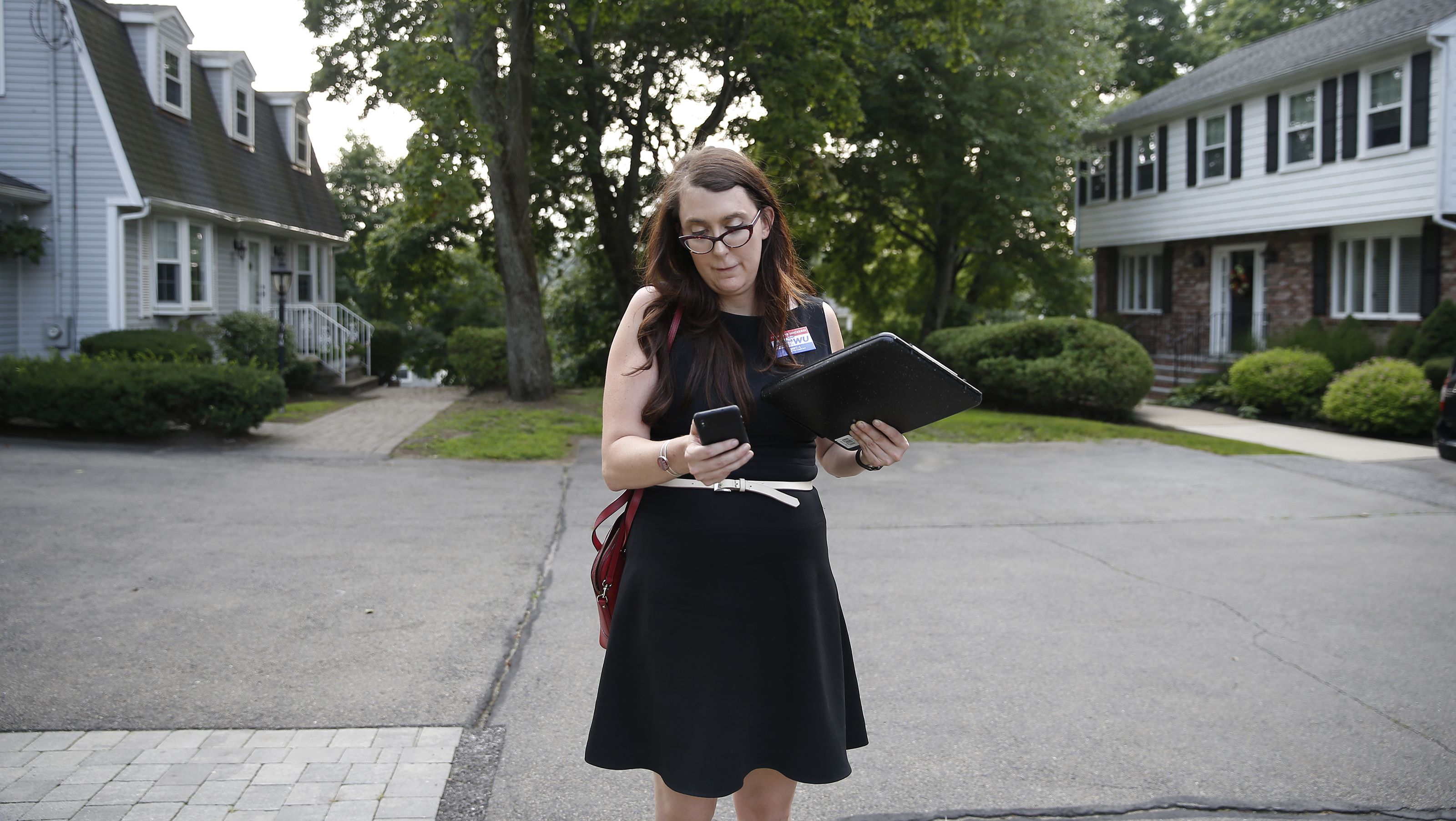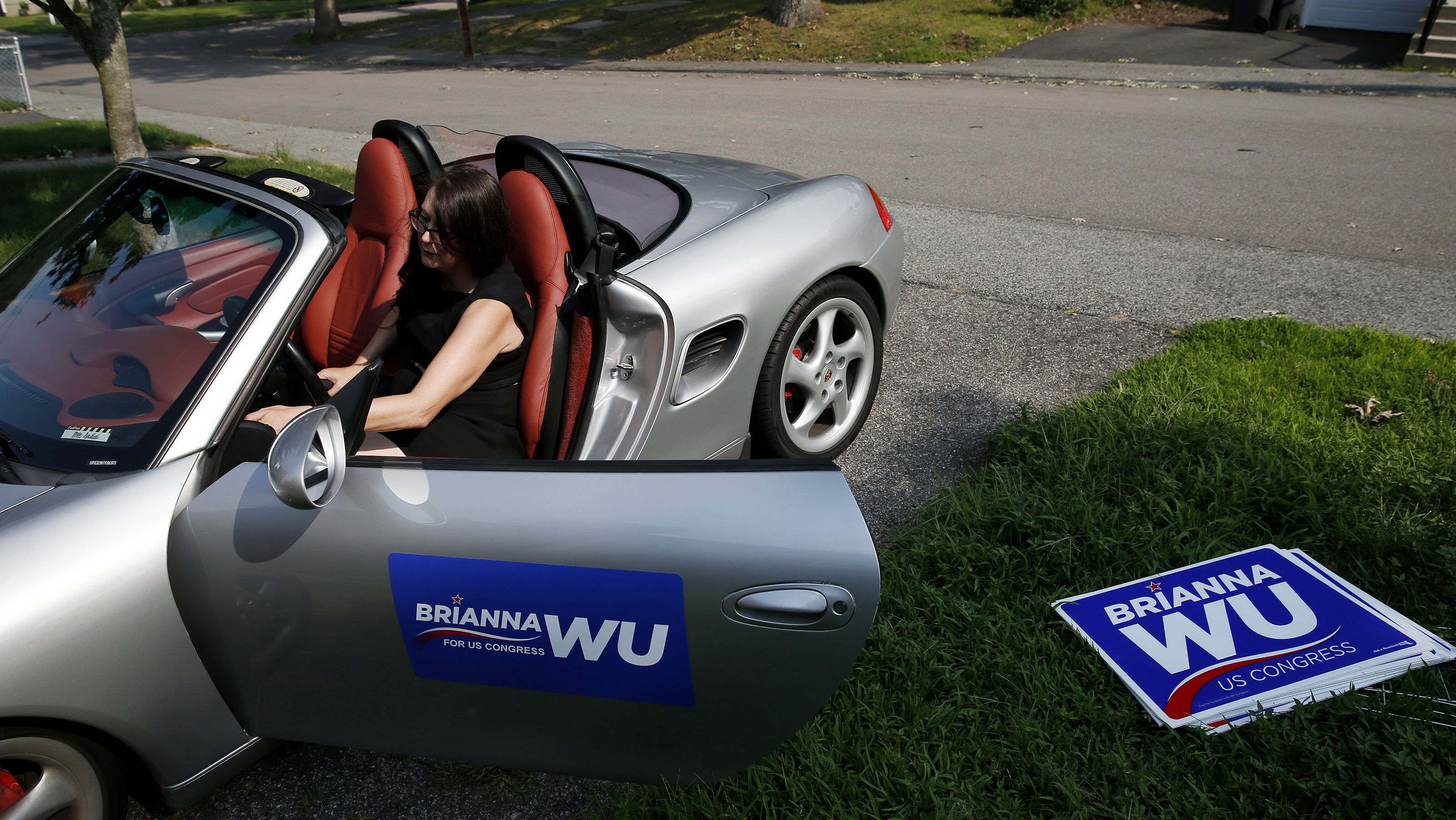I Ran for Congress. I Lost. I'm Persisting. Quitting Is Not an Option in the Trump Era.
Repairing the nation after 2016 was never going to be a quick fix.

It was November 8, 2016, and I was walking out of Hillary Clinton's headquarters. I had been just 30 feet from the podium where I'd hoped to see her accept the presidency. Now, I was trying to come to grips with a Donald Trump America.
At the hotel, a Muslim woman walked into the elevator beside me. We made eye contact, and we burst into tears. Nothing needed to be said. The next day brought cold, colorless rain in New York. I told my husband I needed to quit my job and run for United States Congress.
I was not alone. In his farewell speech, President Obama said, “If you're disappointed by your elected officials, grab a clipboard, get some signatures, and run for office yourself.” More than twice as many women as usual ran for the 2018 elections. America was looking for a hero, and women stepped into the telephone booth and put on our capes.
There’s a common misconception about running for office. People think it’s dreadful, morally compromising work. But I’ve found the opposite is true. It made a better person and a better feminist. It forced me to take a hard look at my shortcomings.
Before I ran for office, I ran a game studio. There’s a common personality type to software developers—one I certainly fall into. We’re more comfortable staring at a screen than staring into someone’s eyes. Engineers can be brilliant in the workplace, and something less-than-brilliant everywhere else. If I was going to run for Congress, I knew I'd have to level up my people skills.
The first thing to go were the headphones, the social armor that was so safe and comforting. Instead of reading books on OpenGL, I found myself reading books on psychology and charisma. Maybe these skills come naturally to some people, but I had to study hard.
Did you know humans only have a single facial expression that signifies delight across gender and cultures? Raising our eyebrows in surprise. It seems silly, but when you meet someone and express delight to see them for a fraction of a second, it puts them at ease. The crow’s feet at the corners of my eyes used to embarrass me—but I learned that crinkle was the difference in a fake smile and a real smile. It was no longer a flaw, but a weapon for making friends.
Get exclusive access to fashion and beauty trends, hot-off-the-press celebrity news, and more.

Brianna Wu
The strangest thing is, having to do this made me a happier person. When I saw someone walking their dog, I smiled. When I noticed kids playing a game, I smiled. In my 20s, cynicism had been my armor, and it was now a liability. In its place, openness and kindness had to take its place.
Here in New England, I got to know almost 100 other women that had decided to run for office, many through the Emerge program for training Democratic women. We were running for mayor, running for state senate, running for Congress. Like me, most of my peers were first-time candidates. We were starting to figure out this alien life of being a political candidate.
And I would love to tell you that we all won. In the movies, the underdog always wins. The Death Star always explodes. Carrie always walks into the sunset with Mr. Big. But reality has somewhat different odds than Hollywood. In a congressional race, the person spending less money wins only 9 percent of the time. You have less than 15 percent chance of beating an incumbent—and those odds are way worse if you’re running for the first time.
The rules of probability cannot bend, and many excellent women candidates lost this year. In California, volcanologist Jess Phoenix lost her bid for Congress. Former intelligence analyst Alexandra Chandler lost in Massachusetts as well as research administrator Sabrina Heisey. And always being one for good company, I lost my race too.
For a first-time candidate who raised under $200,000, I did a fantastic job. I got almost 25 percent of the electorate, with over 17,000 people voting for me. I sometimes try to imagine 1000 people telling me they believe in me enough to be their congresswoman, and it’s overwhelming. 17,000 people believing in you isn’t a loss, it’s an excellent start to a career. The guy I was running against has a 20-year head start.
Why did I lose? It’s a question I’ve had to ask myself honestly. The truth is, you cannot run a political campaign like a tech startup. Technology is a field that fetishizes disruption. The old ways are suspect, and we place an almost irrational trust on new tools. That’s fine for developing games, but it was a failing playbook for politics.

Brianna Wu
There’s no way to “disrupt” the shoe-leather work of shaking hands and listening to people. I was more comfortable in the digital world, but I needed to spend my time in the real one. As the candidate, I could hire someone to produce ads, but only I could raise the money to pay for them. I needed to spend more time raising money and more time spending it.
I find all this energizing rather than discouraging. Running a campaign isn’t just more complicated than I expected, it’s delightfully more complicated. I come from engineering, and failure is an expected state. For 2020, I know what went wrong, and now I know how to fix it.
And make no mistake, every woman that ran this year had successes that can be built upon. Now, I know organizers at every Democratic Town Committee. I know how to get on the ballot. I know how to file an FEC report. I know how to canvas neighborhoods.
If women are looking to replace men at the top levels of leadership, we can expect politics in all its glory, loss and heartbreak included. Careers are not built in a day. One political loss is not the end, and even wins are ephemeral. Creating an equal world for women was never going to be a one-election task.
Make no mistake. There are massive networks of women candidates forming, supporting and teaching each other. And these networks won’t disappear after a single election. Losing any single battle is not losing the war. Studies show if a first-time candidate loses, our odds skyrocket is we run a second time.
Perhaps the biggest lesson I’ve learned from running is that there are no perfect candidates in politics, just candidates. In this field, the only heroes are the ones that do not give up. I plan to persist.
RELATED STORIES

